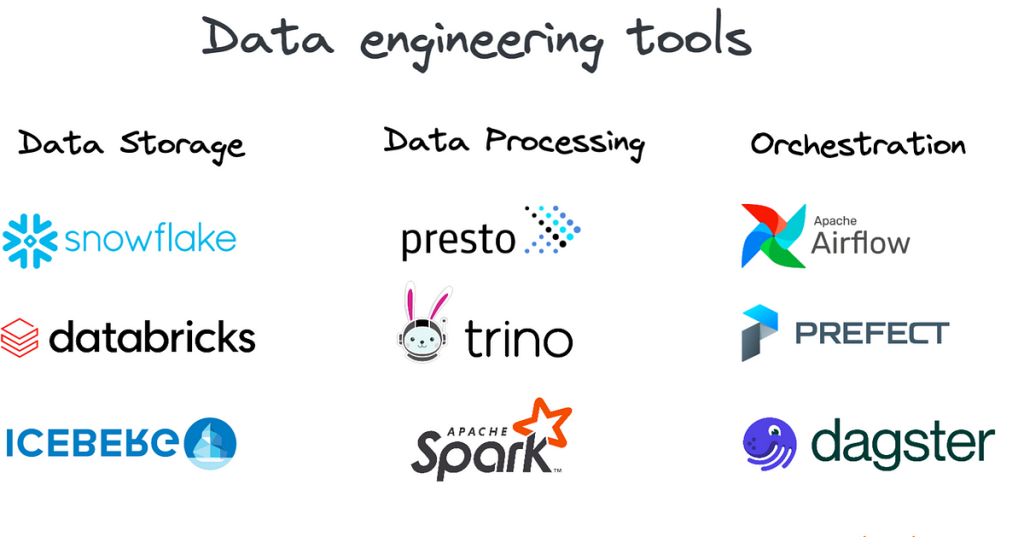
Introduction
Data engineering forms the backbone of modern analytics and data science, empowering businesses to process, store, and integrate data efficiently. As we enter 2025, the landscape of data engineering tools continues to evolve with innovations in automation, scalability, and real-time capabilities. Here are the best tools across three critical areas of data engineering: Data Integration, Data Warehousing, and Data Processing & Orchestration.
Best 10 Data Integration Tools in 2025
Data integration tools help combine data from various sources into a unified format for analysis and operations.
- Apache Nifi
- Open-source tool for automating data flows between systems.
- Drag-and-drop interface with real-time monitoring.
- Talend
- Offers a wide range of data integration solutions, including ETL, big data, and cloud.
- Supports over 1,000 connectors for seamless integration.
- Informatica PowerCenter
- Enterprise-grade data integration tool.
- Known for scalability and high performance in ETL processes.
- Fivetran
- Fully managed ELT tool.
- Automatic schema updates and real-time synchronization.
- Stitch
- Cloud-first ELT tool designed for simple, fast integrations.
- Popular for startups and small businesses.
- Matillion
- Cloud-native ETL tool tailored for modern data warehouses like Snowflake.
- Easy to deploy and highly scalable.
- IBM DataStage
- High-performance tool for large-scale data integration.
- Advanced features for parallel processing and real-time integration.
- AWS Glue
- Serverless ETL service.
- Fully integrated with other AWS services.
- SAP Data Services
- Comprehensive tool for data integration and transformation.
- Robust features for handling SAP and non-SAP data.
- Oracle Data Integrator (ODI)
- Optimized for Oracle environments.
- Powerful real-time data integration capabilities.
Best 10 Data Warehousing Tools in 2025
Data warehousing tools store large volumes of structured and semi-structured data for querying and analytics.
- Snowflake
- Cloud-based data warehouse with unlimited scalability.
- Seamless integration with BI tools and multi-cloud support.
- Amazon Redshift
- Fully managed data warehouse on AWS.
- High-performance and cost-effective for petabyte-scale datasets.
- Google BigQuery
- Serverless, highly scalable data warehouse by Google Cloud.
- Supports real-time analytics and ML integration.
- Azure Synapse Analytics
- Unified analytics platform combining data warehousing and big data.
- Native integration with Microsoft tools.
- Databricks Lakehouse
- Combines data warehousing and data lake capabilities.
- Built on Apache Spark for big data analytics.
- IBM Db2 Warehouse
- Enterprise data warehouse with built-in AI and ML capabilities.
- Ideal for hybrid cloud environments.
- Oracle Autonomous Data Warehouse
- Self-driving data warehouse with automated management and optimization.
- Part of the Oracle Cloud Infrastructure.
- Teradata Vantage
- Scalable data warehouse for analytics.
- Advanced features for multi-cloud and hybrid environments.
- Vertica
- Column-oriented data warehouse optimized for big data analytics.
- Offers in-database machine learning.
- ClickHouse
- High-performance columnar database for real-time analytics.
- Ideal for log analysis and monitoring.
Best 10 Data Processing and Orchestration Tools in 2025
These tools enable efficient processing, transformation, and orchestration of data workflows.
- Apache Spark
- Distributed processing engine for big data.
- Supports batch and streaming data processing.
- Apache Airflow
- Workflow orchestration tool for scheduling and monitoring.
- Highly extensible with Python-based workflows.
- Kubernetes
- Container orchestration platform for managing distributed applications.
- Widely used for deploying data pipelines.
- dbt (Data Build Tool)
- Analytics engineering tool for transforming data.
- Works seamlessly with modern data warehouses.
- Apache Kafka
- Distributed streaming platform for real-time data pipelines.
- Supports event-driven architectures.
- Prefect
- Modern workflow orchestration tool.
- Easy-to-use with a Python-based configuration.
- Dagster
- Data orchestration tool designed for modern data pipelines.
- Focuses on observability and resilience.
- Luigi
- Workflow management system for batch data pipelines.
- Developed by Spotify for managing large-scale ETL jobs.
- Nifi
- Automates data flow processes with real-time capabilities.
- Ideal for IoT and event-based architectures.
- Google Dataflow
- Fully managed streaming and batch data processing service.
- Built on Apache Beam, integrated with GCP.
Emerging Trends:
- GitOps: Gaining traction for managing data pipelines with version control and collaboration, ensuring consistency and traceability.
- AI and Machine Learning: Increasingly integrated into data engineering tools for automation, anomaly detection, and data quality improvement.
- Serverless Data Processing: Offering cost-effective and scalable options for event-driven and real-time data processing.
Choosing the right tools:
With this diverse landscape, selecting the right tools depends on your specific needs. Consider factors like:
- Data volume and complexity: Match tool capabilities to your data size and structure.
- Cloud vs. on-premises: Choose based on your infrastructure preferences and security requirements.
- Budget: Evaluate pricing models and potential costs associated with each tool.
- Integration needs: Ensure seamless compatibility with your existing data sources and BI tools.
- Skillset: Consider the technical expertise required for each tool and available support resources.
By carefully evaluating your needs and exploring the strengths and limitations of these top contenders, you’ll be well-equipped to choose the data engineering tools that empower your organization to unlock valuable insights from your data in 2025.
The data engineering landscape is evolving rapidly, with tools becoming more efficient, scalable, and tailored for specific use cases. Choosing the right tool depends on factors like your infrastructure, budget, and specific data requirements. By leveraging these tools, businesses can streamline their data operations, enhance analytics, and stay competitive in the era of data-driven decision-making.
Say goodbye to the hassles of bike ownership! MotoShare.in offers affordable rentals, whether you need a scooter for errands, a bike for a road trip, or a reliable ride to explore new cities.

 Starting: 1st of Every Month
Starting: 1st of Every Month  +91 8409492687
+91 8409492687  Contact@DevOpsSchool.com
Contact@DevOpsSchool.com
